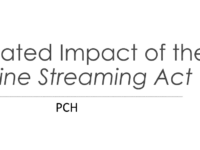The public outcry over the Online Streaming Act is largely in the rear view mirror as the law is now at the CRTC facing years of regulatory and court battles. Last week, the Commission issued its first major ruling on mandated payments by Internet streaming services, a decision that, as I’ve written and discussed, is likely to increase consumer costs with limited benefit to the film and television sector. While Bill C-11 may ultimately become associated with the consumer implications and the CRTC’s failure to consider the market effects, for many Canadians the bill is inextricably linked to fears of user content regulation. For the better part of two years, a steady parade of government ministers and MPs insisted that user content regulation was out of the bill even as a plain reading made it clear that it was in. This week Ministry of Justice lawyers provided their take, arguing on behalf of the government in a court filing that “the Act does allow for regulation of user-uploaded programs on social media services.”
Post Tagged with: "youtube"
Bill C-11 Estimates Revealed: Internal Government Documents Show No Impact on Net Employment, Admit Streamers Already Invest Millions in “Unofficial Cancon”
The government’s support for Bill C-11 has often been framed on economic terms with Canadian Heritage Minister Pablo Rodriguez arguing that the bill will “create good jobs for Canadians in the cultural sector”. I’ve long maintained the government’s claims that the bill will generate billions of dollars in new money was massively exaggerated and that a far more likely scenario would be that the bill would simply lead to a reshuffling of existing expenditures.
Using the Access to Information Act, I have now obtained a copy of the government’s internal estimates for the economic and production impact of Bill C-11 (methodology, memorandum, PPT), which confirm many of my suspicions. While the government is pinning its hopes on massive spending from Internet streamers such as Netflix, it admits that even if the bill did not pass it would not affect net new employment in the sector. Moreover, internally the government recognizes the claim that Netflix and foreign streamers don’t contribute to Canadian content is false, as it has identifies a new category of “unofficial Cancon” which would qualify as Cancon under every measure but for the fact that it is owned by companies like Netflix and Disney. And as for the payments from social media companies that the government insists are so essential that it has fought for years to include user content regulation in the bill? The estimated economic benefit represents just one percent of its total projection for Bill C-11 with pure guesswork about what percentage of content on the platforms might require contributions.
Register Your TikTok Videos at the CRTC?!: Commission Encourages TikTokers To Participate in Future Process on Bill C-11 Content Registration
Even as Canadian Heritage Minister Pablo Rodriguez continues to insist that user content isn’t touched by Bill C-11, the CRTC is sending a different message. In a recent article on how digital creators are contemplating leaving Canada as a result of Bill C-11’s regulation of user content, the CRTC stated:
We strongly encourage interested parties – like TikTok users – to monitor our announcements and participate in public processes. Any decisions on who would have to register and how would only follow those processes, and people should make no assumptions about how the Commission may rule beforehand.
The CRTC and its chair Ian Scott contradicting Rodriguez has been a regular occurrence throughout the Bill C-11 process.
Bill C-11’s Foundational Faults, Part Three: Why the Discoverability Rules Are a Flawed Solution in Search of a Problem
My prior posts on the foundational faults in Bill C-11 focused on the virtually limitless reach of the CRTC’s jurisdictional power over audio-visual services and the risks of treating all audio-visual content as a “program” subject to potential regulation. This post – the first of two on the subject – explains why the discoverability rules that purport to better promote Canadian content are a flawed solution in search of problem that will actually make things worse for Canadian creators.
The discoverability provision, which grants the CRTC the power to establish discoverability requirements as a condition on Internet services, states at Section 9.1(1):
Concerns Mount Over Bill C-10’s Unintended Consequences to Canadian Creators
Google, which did not appear before the Standing Committee on Canadian Heritage as part of its study on Bill C-10 (neither did TikTok, Facebook or other big tech companies with the exception of Netflix), has spoken out over concerns with Bill C-10. The post warns of the “possible unintended consequences that could negatively and unnecessarily impact” both creators and Canadian Youtube users. The company is particularly concerned with the discoverability requirements that have been expanded to include user generated content:











